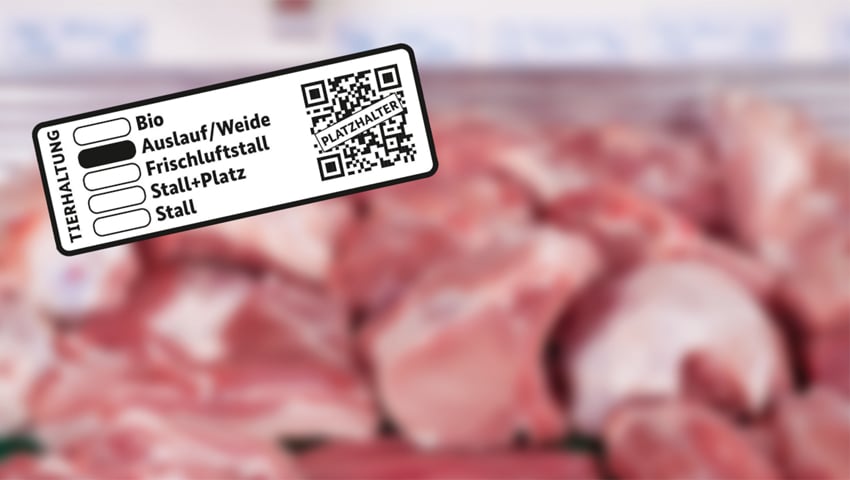THE German Bundestag has adopted a mandatory method of production labelling for meat and dairy products. Labelling will be introduced first for pork products, but will soon be extended to all animal-derived products.
With labelling discussions on-going in the United Kingdom, it is perhaps only a matter of time before a similar approach is adopted in Britain.
The label, initially proposed by Federal Minister Özdemir, is intended to provide transparency and clarity on how animals are kept and to enable consumers to make informed purchasing decisions. The Bundestag also adopted amendments to the Federal Building Code to facilitate the conversion of animals housing.
Federal Minister Cem Özdemir said “After years of standstill, we are giving our farmers a perspective by enabling them to earn good money with more animal welfare. I want good meat to continue to come from Germany in the future. Our husbandry labeling is a prerequisite for this – and at the same time a huge step towards more transparency when shopping, because consumers can give the market a decisive direction towards more animal-friendly husbandry. What others have always only announced, we are implementing here – just like a long-standing demand from agriculture by expanding the labeling of origin for meat. In this way, consumers can actively support regional value creation and high environmental and animal welfare standards.
The mandatory method of production label differentiates between five types of animal husbandry: indoor housing; indoor+space; indoor with fresh air; outdoor runs/pasture; and organic.
As a first step, the Act sets out regulations for fattening pigs, but it is intended to be rapidly expanded to include other animal species, as well as other areas of the processing chain, for example the restaurant and catering sector, and the life cycle of animals.
The aim is for consumers to be able to see at a glance how the animals were kept on farms in Germany. The label provides customers with neutral information about how the animals were kept, so the system is objective, not subjective.
To this end, the Federal Ministry of Food and Agriculture (BMEL) is working on a mandatory and transparent animal husbandry labelling system for all foods of animal origin originating from Germany.
In addition, the draft Act on Animal Husbandry Labelling created a voluntary option for food from other EU Member States and third countries to be labelled as well.
Basic information on animal husbandry labelling:
- The labelling will be based on the conditions under which animals are kept during the so-called ‘productive period of life’; in the case of meat, this is the fattening period.
- The label will distinguish between five different types of husbandry: indoor housing; indoor+space; indoor with fresh air; outdoor runs/pasture; and organic.
- Indoor housing: during fattening, the animals are kept in line with the minimum legal standards.
- Indoor+space: the pigs have at least 12.5 percent more space compared with the minimum legal standards. The pens must contain coarse fodder, in addition to the occupational material, and be structured to include different elements, for example partitions, different levels, and areas with different temperatures or lighting conditions.
- Indoor with fresh air: the outdoor climate in each pen has a significant effect on the sty climate. The pigs have access to different areas with different climates at all times.
- Outdoor runs/pasture: the pigs must be provided with an outdoor run which is accessible all day, or kept outdoors all day with no permanent housing. The outdoor run may be interrupted briefly for the necessary duration of the cleaning process or for a short period, insofar as this is absolutely necessary in individual cases for reasons of animal welfare.
- Organic: The livestock husbandry meets the requirements of the EU Regulation on Organic Farming. This means an even larger outdoor run and even more space in the pigsty. EU Regulation on Organic Farming This means an even larger outdoor run and even more space in the pigsty.
Irrespective of the animal husbandry label, farmers who offer their animals particularly humane husbandry conditions and convert the housing for their livestock accordingly should receive financial support. The BMEL says it will flank and support farmers in the transition towards more animal welfare, environmental protection and climate change mitigation.
The German Bundestag’s Committee on Food and Agriculture adopted the draft Act on Animal Husbandry Labelling on 19 April 2023. The draft presented by Federal Minister Cem Özdemir was debated in its first reading in the Bundestag on 15 December 2022. These are further important steps towards making progress in transitioning towards a future-proof animal husbandry system in Germany.
